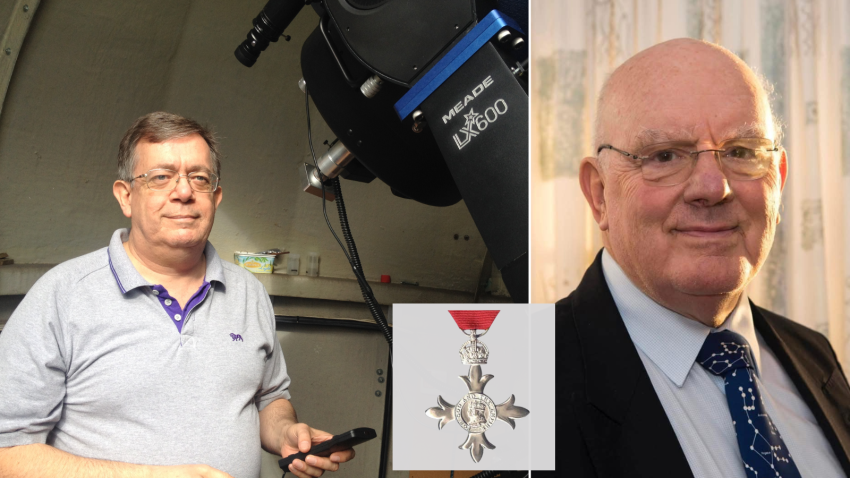A cruise ship astronomer and Dark Sky ambassador – both Fellows of the Royal Astronomical Society (RAS) – have been recognised in the New Year Honours list.
Paul Fellows, the chairman of the Cambridge Astronomical Association, received a British Empire Medal (BME) for services to astronomy, while Howard Parkin was made a Member of the Order of the British Empire (MBE).
The latter is the vice-chair, founder member and former chair of the Isle of Man Astronomical Society. He was recognised for services to the understanding of astronomy and to the Manx community.
Mr Parkin, who has been teaching astronomy to adults at the University College of Man for nearly 40 years, said he was "delighted, proud and honoured" to receive an MBE.
"I regard the award as a tribute to all the people who have shown interest and enthusiasm in the subject over the years," he added.
"I have been passionate about astronomy since I was a youngster and to receive this award for passing on some of my passion to people of all ages is an honour and privilege. I really enjoy making an audience aware of what the heavens have got to offer, and I get real pleasure out of inspiring children about the subject. Their own interest and enthusiasm is exhilarating and infectious.
"I look forward to sharing my interest and enthusiasm for the subject on the Isle of Man and further afield when the opportunity arises for many years to come."
In 2012, while working at Manx National Heritage, Mr Parkin applied to have seven sites on the Isle of Man nominated for Dark Sky Discovery status. This was followed by a further 19 sites in 2013, leading to the island being acknowledged as one of the best areas in the British Isles for Dark Skies.
He has a monthly programme on Manx Radio, regularly reporting on astronomy, and has appeared on television talking about Manx astronomical connections.
Mr Parkin obtained a Bachelor of Science degree in Astronomy in 1996 and became a Fellow of the RAS in 2013.
Mr Fellows said he was "very surprised and pleased" when he heard of his award, adding: "It came out of the blue but it is wonderful to have all the efforts I have put in recognised in this way!"
With the help of the RAS Mr Fellows has been a presenter on a cruise ship, giving lectures and driving the planetarium on the Queen Mary 2 – a role he described as a "real privilege and a treat for me too!”
Mr Fellows grew up near Portsmouth and developed an interest in astronomy as a young teenager. At the age of 13 he had his first look at the rings of Saturn using a small telescope that his physics teacher father had brought home from school for the weekend.
He said: “One look and I was hooked! I built my own 8-inch reflector out of second hand parts, including bits of my grandfather’s greenhouse as I recall, and used it to do observations for my GCSE in Astronomy at the age of 14.”
He moved to Cambridge in 1979 to study natural science at Emmanuel College, before following this up with a second degree in computer science. Mr Fellows went on to co-found a number of technology businesses in the Cambridge area but also maintained an interest in astronomy.
For the past two decades he has been co-presenting the public open evenings at the Institute of Astronomy in Cambridge.
RAS President Professor Mike Lockwood said: "Both Paul Fellows and Howard Parkin, through their great enthusiasm for astronomy and their tireless commitment to engaging the public, are excellent examples of people who are vital to the future of astronomy.
"This is because their passion is infectious and the knowledge they impart is inspirational. Furthermore, it doesn't stop there because the knowledge is passed on and interest in astronomy frequently attracts younger generations into careers in science and technology."
Media contacts
Sam Tonkin
Royal Astronomical Society
Mob: +44 (0)7802 877700
Robert Massey
Royal Astronomical Society
Mob: +44 (0)7802 877699
Notes for editors
The Royal Astronomical Society (RAS), founded in 1820, encourages and promotes the study of astronomy, solar-system science, geophysics and closely related branches of science. The RAS organises scientific meetings, publishes international research and review journals, recognises outstanding achievements by the award of medals and prizes, maintains an extensive library, supports education through grants and outreach activities and represents UK astronomy nationally and internationally. Its more than 4,000 members (Fellows), a third based overseas, include scientific researchers in universities, observatories and laboratories as well as historians of astronomy and others.
The RAS accepts papers for its journals based on the principle of peer review, in which fellow experts on the editorial boards accept the paper as worth considering. The Society issues press releases based on a similar principle, but the organisations and scientists concerned have overall responsibility for their content.
Keep up with the RAS on X, Facebook, Instagram, LinkedIn, Bluesky and YouTube.
Download the RAS Supermassive podcast


